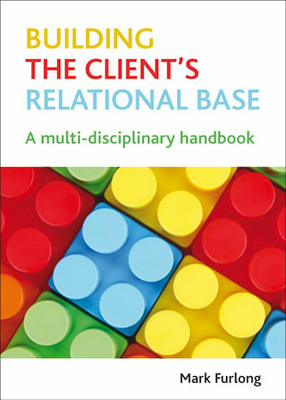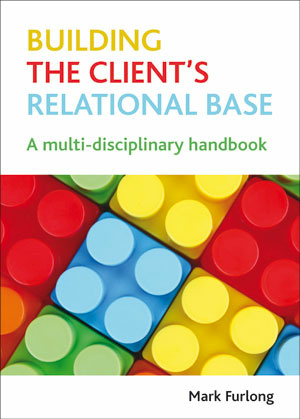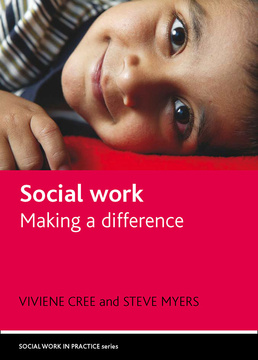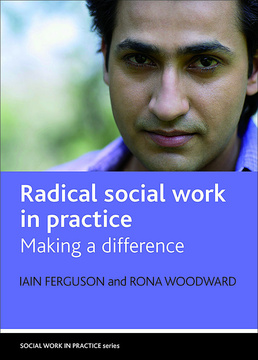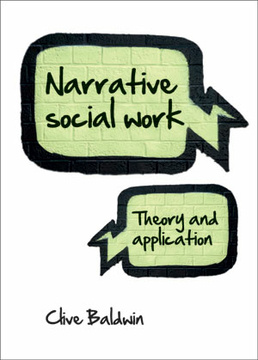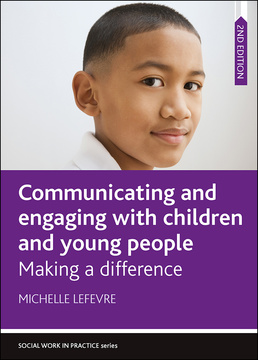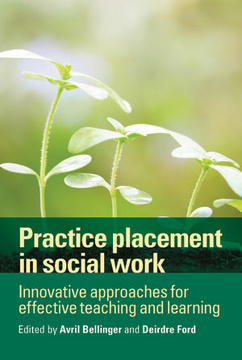Published
Feb 27, 2013Page count
320 pagesISBN
978-1847428615Dimensions
240 x 172 mmImprint
Policy PressPublished
Feb 27, 2013Page count
320 pagesISBN
978-1847428622Dimensions
240 x 172 mmImprint
Policy PressPublished
Feb 27, 2013Page count
320 pagesISBN
978-1447308676Imprint
Policy PressPublished
Feb 27, 2013Page count
320 pagesISBN
978-1447312222Imprint
Policy PressDeveloped from nearly 20 years' practice and consulting experience, this ground-breaking text challenges practitioners to understand, and work, with their clients as relational beings rather than independent units, whatever the presenting problem might be. The book focuses on an often neglected key condition, that sustainable and accountable personal relationships are a precondition for health and well-being, and argues that there are always opportunities to deepen the quality, and range, of the client's connections with their current and future significant-others.
The central concern of the book is to describe practical actions that can be taken by any professional committed to strengthening the relational base of their clients - an agenda that is supported by coherently woven insights from critical theory and social epidemiology. Written in a compelling style and brought to life with more than twenty case vignettes, this original, practical and rich resource offers practitioners usable resources that can be incorporated within many practice roles.
Especially relevant to senior students and those in casework, this innovative, timely, multidisciplinary material is ideal for all those who wish to make a practical difference to the lives of their clients.
“This book is a vital source for the development of a truly new psychotherapy. Mark Furlong makes a thorough critique of the twentieth-century individualist bias of Maslow's “self-actualization,” showing how its model of individual therapy has contributed to the alienation of our times. Instead, he presents this rich, sometimes playful and humorous book expressly for serious junior workers on the front lines, and their supervisors. For them, he shares his experience as a teacher and program innovator, drawing on a broad base in psychiatric epidemiology, anthropology, and outcome studies as well as feminist and critical theory. He takes up system dilemmas such as confidentiality and family consultation. His vignettes and model conversations show how to mobilize the imagination, curiosity and courage of even the most beleaguered clients, to explore and discover the latent power of their social supports.” C. Christian Beels, MD, MS.
"How can we notice the ways in which individualism may be inadvertently influencing our practice? How can we resist becoming an accomplice to isolation and instead become agents for connection? Not only does Mark Furlong pose important questions in this book, he also offers a wide range of practices to assist us to interrupt cycles of loneliness in contemporary Western culture." David Denborough, Dulwich Centre Foundation International
"Mark Furlong has written a valuable sourcebook that will appeal to a wide range of practitioners who are seeking a new yet rigorous approach to their work with clients. It draws creatively on theories of individualism, isolation, inequality and exclusion to make a strong case for practice that supports clients to build new relationships and strengthen existing ones." Rona Woodward, University of Stirling
'Theoretically sophisticated and very practice oriented; Mark Furlong makes a significant contribution to promoting professional practices which aim to develop the client's 'relational self'. A very timely and engaging book'.
Professor Nigel Parton, School of Human and Health Sciences, University of Huddersfield
“The importance of people – and their relationships – lies at the heart of this scholarly text. It offers fascinating coverage on how practitioners can strengthen the relational-base of clients - and achieves this brilliantly. Highly recommended.” Pamela Trevithick, Visiting Professor in Social Work, Buckinghamshire New University
"This book is a refreshing re-examination of current practice and helpful in suggesting a variance in approach that might be effective in terms of outcomes for the client: it is well worth reading." British Journal of Social Work
Mark Furlong, PhD., is a senior lecturer in the School of Health and Social Development at Deakin University in Melbourne. Previously, he practiced in therapeutic and mental health settings where he specialized in consulting, training and practicing from a relationship-building perspective. He has published in numerous publications in the psychiatric, family therapy, family studies, psycho-therapeutic, social work and primary health fields.
Introduction; Anchor points; Isolation and its accomplices; How are we getting along?; Questioning professional norms; The practitioner's context; Attitudes determine practice; Relationship-building skills; Learning to act well relationally; Being an agent of cultural change







